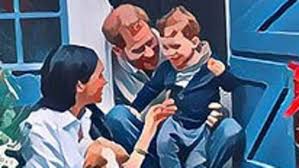Picture curtesy of Newsweek.com
Prince Harry and Meghan Markle were forced to change their names on Archie’s Birth Certificate. Whats the big deal! I hear you ask. This is not as trivial as it seems though, as it goes to the heart of Archie’s naming, history of his birth and to his very identity.
Psychoanalysis places considerable importance on names. Several sayings circulate widely. Nomen est omen (Name is destiny) being one of them. ‘The sins of the parents become of the symptoms of the child’ being another. But this is not only unique to Psychoanalysis, Family Therapy has long acknowledged the ‘intergenerational transmission’ of values, rules and history.
Names of our children are rarely chosen completely at random. Even when they are, well, that tells a particular story about the namers, now doesn’t it!.
Generally, a child’s name communicates the parents aspirations and inspirations. Whether it be to name a boy after one’s grandfather, communicates something of the aspiration, that little Frank will one day grow to be everything, and more that grandfather Frank embodied and had achieved. Conversely, to name a child after a famous movie star or singer, communicates the desire for one’s child to become the inspiring figure these individuals no doubt are.
However, names also communicate a wealth of information about the struggles of the parents too. Naming after someone famous might imply a dissatisfaction with one’s lot in life, an aspiration for the next generation to achieve more or to have a life without such struggles.
This is no more true of Prince Harry and Meghan Markle than it is for anyone else. The name Archie is apparently entirely new for the British Royal family, a name not associated with any preceding royal. This simple gesture marks the parents as trailblazers: ‘We will not follow tradition’. However, there is meaning in the name Archie (short for Archibald) that signifies genuine, bold and brave. Harrison is the Nordic, Son of Harry.
It is interesting that the symbolism of the name Archie communicates so much of Prince Harry and Meghan Markle’s struggles to separate from the royal family. It also seems to touch on something of Princess Diana’s – and her boys’ reported yearning for honesty and authenticity. To mark a child as Harrison stamps Archie indelibly as the Son of Harry – as if we were in any doubt about that? It is curious though, does this speak to an undercurrent of anxiety around paternity?
As for the PR debacle of being ‘forced’ by the royal family, read here The Queen, to change the parents’ names on Archie’s Birth Certificate. If we are to believe the reports, the birth Certificate originally proclaimed as parents ‘Rachel Meghan Her Royal highness the Duchess of Sussex’ and ‘His Royal Highness Henry Charles Albert David Duke of Sussex’. These were changed to include ‘Prince’ in the name of Harry and to remove altogether ‘Rachel Meghan’ from her title.
This surely speaks to Meghan Markle’s understandable desire to be recognised in her own right. A recognition that appears not to be forthcoming from the Royal family. This change also erases Meghan’s identity as woman, wife and mother and reduces Archie’s maternity to a mere placeholder that could arguably be filled by anyone.
This is the melting pot of intrigue that little Archie has been born into. A name that is both aspirational but also a mark of paternity. The Birth Certificate also communicates so much about the ongoing tensions between the House of Windsor and Sussex. A tension far from being resolved and a worthy name marking Archie as one born into a desire for separation.
This issue of one’s name is of absolute relevance to my clinic. I have written elsewhere about the importance of the unconscious. People often enter treatment with questions around identity, purpose and past. The answers are often buried deep. Recognising that each person brings with them a history that commences at conception, helps understand identity and consolidates us as individuals within a constellation of generations. Better still how we can make the most of the legacy that we inherit.

Recent Comments